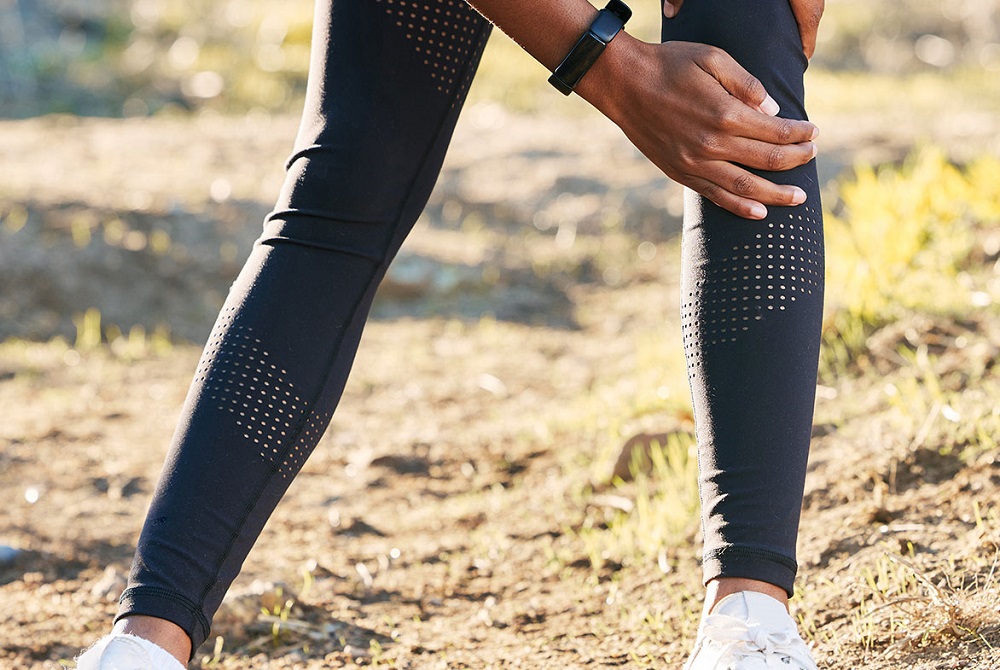
Snap, Crackle & Pop: Why Do My Knees Make Noises - And Should I See a Doctor?
April 5, 2022
Do you ever just go about your daily life and then, seemingly out of nowhere, your knee makes a noise?
You might call it a weird idiosyncrasy and not think twice about it—or you might turn to the Internet to try and find all of the potential issues that might be wrong with your knee.
But if your knee pops or cracks once in a while, it’s usually no cause for concern. After all, joints sometimes make noises, and knees are no exception (especially when you squat or sit down.)
“Infrequent knee pops and cracks are more common in the younger population, says Nancy White, M.D., a sports medicine physician at Henry Ford Health. “When you feel that ‘pop,’ it means your kneecap was pulled a bit outside of where it’s supposed to be, and so it’s correcting itself and getting back into position. You can kind of feel that something moved.”
If, however, pain or swelling accompanies a noisy knee, you should have it evaluated by a sports medicine provider. And if your knee is popping or cracking regularly, that's another sign you should have it checked out.
“If you let it go, your knee could get worse,” says Dr. White. “There are recommendations a doctor can make to prevent this from happening, such as strengthening and flexibility exercises.”
What Is Knee Crepitus?
If your knee sounds like Rice Krispies crackling (or you experience a grinding sensation) it likely means you have knee crepitus, which can signify the beginning of osteoarthritis behind the kneecap.
“Knee crepitus is primarily caused by an issue called patellofemoral dysfunction,” says Dr. White. That sounds like a mouthful, but it means that your knee isn’t tracking straight up and down like it’s supposed to.
“There’s cartilage on the back of your kneecap and on the front part of your thigh, and the cartilage on the front part of your thighbone makes a groove so the kneecap can glide straight up and down in a floating position,” says Dr. White. “If the cartilage is worn down (and inflamed, worn-down cartilage signifies osteoarthritis), the kneecap can’t smoothly glide up and down, causing knee crepitus.”
If you are experiencing knee crepitus, you should see a sports medicine primary care physician, especially if it is accompanied by pain. They can recommend a variety of treatments, such as physical therapy and cortisone injections.
Still not sure if your noisy knees are cause for concern? When in doubt, call your doctor. After all, the sooner your doctor can examine it, the sooner you can prevent an issue from getting worse.
To learn more about your orthopedic condition or to find a provider, visit henryford.com/ortho.
Dr. Nancy White is a sports medicine physician with Henry Ford Health. She sees patients at Henry Ford Medical Center – Novi, and Henry Ford Medical Center – Bloomfield Township.

Why Spring Sports Injuries Are Common & How To Prevent Them
April 11, 2023
When spring is in the air, athletes of all ages head outdoors to play their favorite sports, including softball, baseball, tennis, lacrosse and track & field.
 Unfortunately, the change of season also ushers in injuries, says Joseph Medellin, M.D., a primary care sports medicine doctor at Henry Ford Medical Center-Jackson. A variety of factors can cause spring sports injuries, including:
Unfortunately, the change of season also ushers in injuries, says Joseph Medellin, M.D., a primary care sports medicine doctor at Henry Ford Medical Center-Jackson. A variety of factors can cause spring sports injuries, including:
► Too much or too little winter activity: With shorter days and colder temperatures, some athletes aren’t as active in winter. Even if you are going to the gym regularly, sport-specific muscles – like muscles in the chest and shoulder that help you throw a baseball – may weaken.
At the start of a new sports season, a sudden increase in the demand on these muscles can lead to injury. Taking steps to get ready for spring sports before the season starts can lower this risk. It’s also not uncommon for multi-sport athletes to have games and practices year-round with multiple practices in one day. Not allowing yourself enough downtime can lead to overuse injuries, including strains and sprains.
► Transitioning outdoors: Winter sports often take place on hard surfaces, like wood basketball courts, gyms and treadmills. These surfaces are flat, making it easier to maintain your footing. Spring sports involve soft running surfaces like grass and turf that are uneven. They can also be wet, muddy or icy due to spring weather. All these circumstances increase the risk of injury due to falls.
Cold weather can also be a factor. Early spring temperatures can still be quite cold. It takes longer for muscles to warm up, and they might not work as efficiently. This can be especially troublesome with sports like softball where there are lulls in activity between innings. Playing with cold muscles can increase the risk of sprains and strains.
► Sport-specific movements: Throwing, sprinting and kicking are moves that most people don’t do on a daily basis. They require powerful motions that can stress unconditioned muscles and joints. This is especially true if you haven’t been cross-training to strengthen supporting muscles or haven’t gradually increased your intensity.
A sprinter may experience hip pain from running at full speed around the curve of a track. Rotator cuff injuries can occur in sports that involve throwing, like the javelin, shot put, and baseball and softball. Soccer players can pull their groin from repeatedly taking long kicks.
If You Suspect A Sports Injury, Don’t Put Off Care
A doctor’s office is often the last place eager athletes want to be at the start of the season. But pain should not be a regular part of your training program. If you think you’ve sustained an injury, trying to push through often makes it worse.
Making time to see the doctor can be challenging, especially if you have to miss a practice or game for your appointment. But it’s worth it. “The sooner you get evaluated, the sooner we can get you on the path to recovery,” Dr. Medellin says.
The opposite can be said when treatments are delayed. “The longer you’ve had an injury, the longer it may take to heal,” explains Dr. Medellin. “And first-line treatments aren’t as likely to be successful, which can mean more time away from your sport.”
Sports Injury Treatments That Keep You In The Game
Seeing a doctor doesn’t always mean you’ll have to sit out the season. Treatment may include intermittent rest, as long as you don’t have a severe injury like a stress fracture or tendon tear. “We may recommend a return to sport at a lower intensity or with additional rest days to see if the pain goes away,” says Dr. Medellin.
Patients with minor injuries might also benefit from physical therapy between practices. Physical therapists can correct poor form. They can also help you safely stretch and strengthen injured muscles to promote healing. Conditioning through Henry Ford Health's sports performance program can also speed recovery and prevent injury.
“A sports medicine doctor’s goal is to keep athletes active and involved in the sport they love,” says Dr. Medellin. “That’s what I want for my patients.”
To find a sports medicine provider at Henry Ford Health, visit henryford.com/sportsmedicine or call 313-651-1969.
Joseph Medellin, M.D., is a primary care sports medicine doctor at Henry Ford Medical Center-Jackson.


